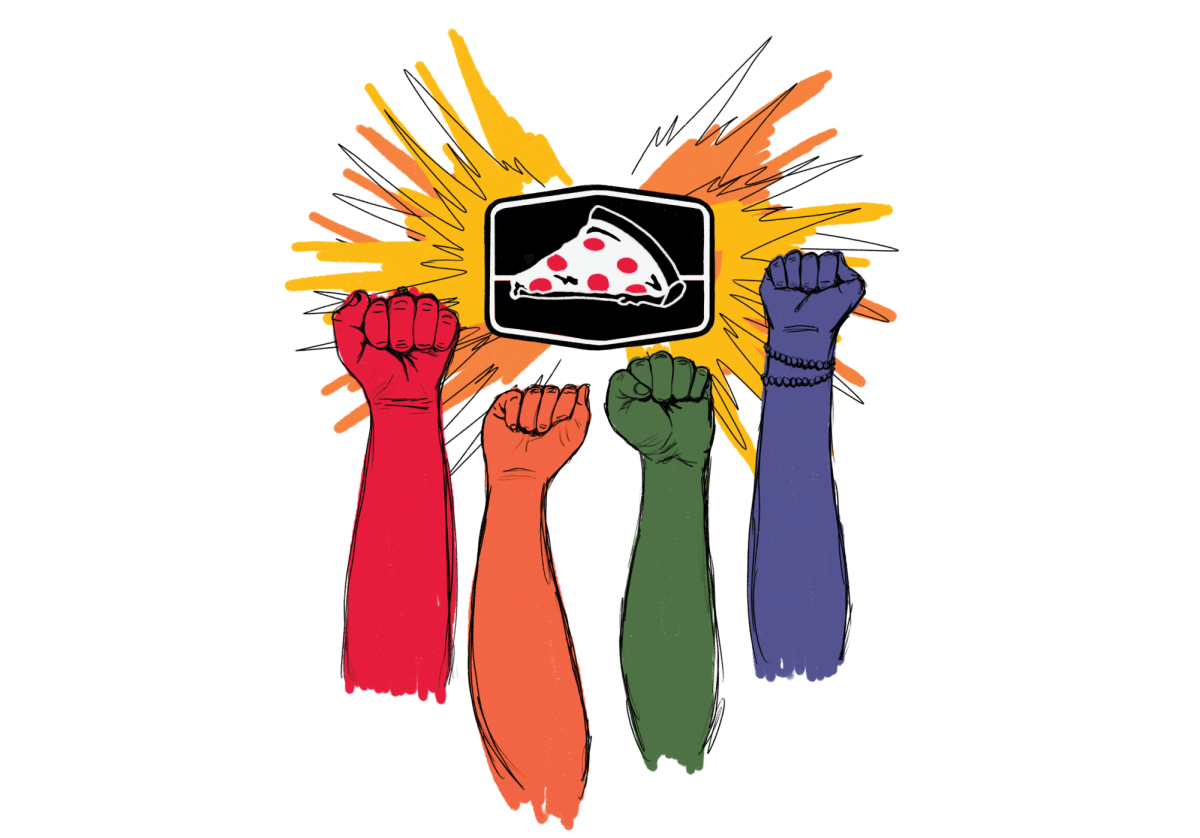With their fresh Detroit-style pizza and retro vibe, Via 313 is an Austin staple, but with rising rent costs and declining working conditions, the workers feel that they should be treated better.
In August 2022, Via 313 workers filed for a union election in three of their nine Texas locations: Oak Hill, Eastside, and North Campus. The workers filed for unionization after experiencing harassment, being forced to work in kitchens as hot as 100 degrees, and receiving no sick pay. John Cuvillier, a former employee and current union organizer for workers at Via 313, felt the need to bring attention to these issues.
“Via 313 was one of the hardest jobs, no, it’s the hardest job I’ve ever worked,” Cuvillier said. “We started our own union because we couldn’t find anyone else to take us in.”
Restaurant Workers United (RWU), a nation-wide worker’s union, was formed in August 2020 to support the restaurant, cafe, and bar workers of America. Because the restaurant industry is generally very unorganized, and RWU was able to help Via 313 worker organize and stand up for themselves.
“I’ve been a service worker since I was 15 years old, and I was sick of feeling powerless and feeling like I was replaceable,” Culliver said. “We decided enough was enough and we wanted to do something about it.”
Cuvillier said that the service industry is generally unorganized since there is a low union density. Union density is the percentage of workers who have unionized compared to non-unionized workers. The restaurant industry has only about a 1.2 percent union density compared to a 10 percent national average across all industries.
“Our industry is really overlooked, very exploited, and the majority of workers are Black and brown,” Cuvillier said. “A lot of people don’t see restaurant work as real jobs. Some people say it’s a job for kids to make pocket change, but in my experience, that’s not been the case. In reality, there are hard-working men and women that rely on these jobs to feed their families, to pay their bills. A lot of us work two jobs.”
The workers at Via 313 felt it necessary to advocate once the company was bought out by Savory Restaurant Fund. Elyanna Calle, a server at the North Campus Via 313 location, has felt a big change in her day-to-day life ever since Via 313 was bought out by Savory.
“When things became corporate, a lot of standards started to decline,” Calle said. “Heat in the kitchen was one of the big things that applied primarily to back a house but still affects everybody in the restaurant.”
Savory, a private equity firm that started in 2020, is based in Lehi, Utah, and currently operates in eleven states. According to Culliver, private equity prioritizes profit over people.
“The goal of private equity is to make as much money for their shareholders as possible, to maximize profits,” Cuvillier said. “The only time they would come to Austin is when they flew out on their private jets to come cut costs.”
According to the workers, while employees were trying to organize the union, the company hired a firm that the workers believed was intended to intimidate them. The firm would hold mandatory captive audience meetings in the early morning, fire workers, and spread fear amongst employees.
“[They] would do as much as [they] could to, not only convince us it wasn’t worth it, but to plant seeds of doubt, and to spread fear amongst our coworkers, and divide us,” Cuvillier said.
In August of this year, a manager at the North Campus location was terminated for what Via 313 employees claimed was retaliation for unionizing. To combat this claim, employees, supporters, and other union representatives from all different sectors participated in a sip-in. A sip-in is when supporters go into a store during rush hour, pack the restaurant for a few hours, and only order water while tipping large.
“The goal was to, in an active protest, stop the company from making money during this period of time,” Cuvillier said. “But ensure that our servers were still taking home enough to put food on their table.”
Through the process of unionizing, the workers considered boycotts but eventually decided against them because they were not making enough money to live and boycott at the same time. This is what drew them to a sip in.
“We don’t ask for boycotts because that worsens and affects front-of-house wages,” Calle said. “So, we love it when people come into the store and support the union workers.”
The federal minimum wage is $7.25, while the subminimum wage for tipped workers is $2.13. The servers and bartenders at Via 313 earn $2.13 an hour plus tips.
“Tipped minimum wage has been the same for over 30 years,” Culliver said. “We haven’t seen an increase.”
According to Via 313 workers, the tipped wages system makes their job more challenging. The hostile work environment opens up ways for customers to mistreat them because they need tips.
“Rely[ing] on tips for a living creates an environment where customers can mistreat you, and belittle you,” Cuvillier said. “But because you have to pay your bills, you have to take it, and take it with a smile.”
The tipped wages system has its origin in the Reconstruction era when newly emancipated African-American slaves were paid only in tips so restaurant owners didn’t have to pay them anything.
“Tipping wages is just a way to get away with paying your workers less,” Calle said. “[This is] because tipping is commonplace in the U.S..”
On top of low wages, COVID-19 was a hard time for restaurant workers everywhere. Employees kept getting sick, workers were laid off, and many had family members to take care of, which caused a lot of people to leave.
“A lot of people were out for two weeks and couldn’t pay their rent because we [didn’t] have paid time off, sick pay, any of those things,” Calle said.
During the height of the Omicron variant last year, employees from three stores signed a petition demanding sick pay. When the company declined, they held a protest in January 2022.
“Once Omicron and people were out, we started drafting a petition, and when people got suspended, we had a protest two days later,” Calle said. “So we did act pretty quickly.”
After the company declined, the workers at Via 313 felt powerless and like they had to do something. This is what drove them to hold the protest. Additionally, the workers wanted to make sure they had support from their coworkers to ensure action.
“We have to take collective action because our real power relies on labor,” Cuvillier said. We signed up around 80 percent at all stores. So we had a supermajority before we filed for an election.”
Though the Via 313 workers could end up winning all three union elections, where workers vote on whether or not to unionize, it still remains to be seen whether all of the workers’ concerns will be addressed.






